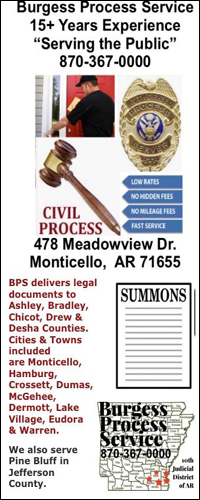Council Makes Economic Development Contract “Professional Service” – Selects MEDC to Continue During Interim
January 8th, 2015 byIn a special called meeting Wednesday evening, January 7, the Monticello City Council passed a resolution to reject the bids submitted for economic development services on November 21, 2014; to declare economic development services as professional services; to authorize the publication of requests for qualifications for economic development; and to extend the current “contract” with Monticello Economic Development Commission to February 28.
At the last Council meeting in December, the Council had voted to continue with MEDC for their economic development services, even though P. F. Mays and Associates, LLC, had submitted a lower qualifying bid. Mays based her bid on the requirements as advertised in the request for bids. MEDC had based their bid to include additional services they have been providing, but that were not mentioned in the advertised request for bids. This resulted in bids being submitted that were not for the same services.
The Council chose MEDC despite their higher bid, among other reasons, because it included the additional services that were not advertised in the bid request.
Also at the December meeting, the Council voted to declare economic development a professional service, thus eliminating the bidding process as part of the selection criteria.
On December 30, Mayor Joe Rogers vetoed the votes, citing concerns that the Council’s actions were not based on valid criteria and could risk subjecting the City of Monticello to lawsuits.
Mayor Tucker stated that the Council now has two choices; to overturn Mayor Rogers’ actions, or admit that there was a little bit of confusion and probably misnomers, and that the Council needs to start over from scratch, which was Tucker’s recommendation.
Joe Meeks requested that the current resolution be read publicly, before taking further action.
Mayor Tucker stated that Monticello is in the middle of a lot of economic development activity. He said there is an industry prepared to move to Monticello with a multi-million dollar project, and there are other active prospects. Tucker stated because of this, he did not think there needs to be a lag time in selecting services, and encouraged the Council to move forward with this process as quickly as possible.
Tucker submitted to the Council a draft of potential qualifications for use in selecting future economic development services.
In future, anyone interested in providing economic developmemt services for the City, would be required to submit a resume of qualifications.
Council member Cedric Leonard questioned one of the qualification requirements that future service providers must be able to identify and secure land for future industrial growth.
Leonard felt that this would provide an unfair bias in favor of MEDC, which already owns the industrial park.
Mayor Tucker agreed that in considering applicants, already owning an industrial park would be an advantage.
After discussion, the Council voted to extend the “contract” of MEDC To provide economic development services, and to declare the services to be professional services.
Choose another article
Newer article: Sav-A-Lot Special Values
Older article: Council Approves Mediation with Siemens

























































It ‘s interesting to see the numbers of ways the private sector has of transferring public monies away from sunshine law coverage
The following sunshine laws were made to protect the public and certainly removing any process from public bidding is an opportunity for abuse or misuse of these funds.
Take a look at these laws and then figure how much has been paid to MEDC year after year and see if the total results were worth it.
The Source for Freedom Of Information Law and Action
News
Opinion
Project ’99
Charts / Data
Links
TEXT OF THE ARKANSAS FREEDOM OF INFORMATION ACT
FOIArkansas Project
Act 93 of 1967
As amended by Act 1201 of 1976; Act 652 of
1977; Act 608 of 1981; Acts 468 and 843 of 1985; Acts 1001 and 49 of 1987; Act 8 of the 3rd Extr. Session of 1989; Act 895 of 1993; Acts 873 and 1335 of 1997; Acts 1093 and 1589 of 1999,the same being Ark. Code Ann. § 25-19-101 et seq.
25-19-101. Title.
This chapter shall be known and cited as the
“Freedom of Information Act of 1967.”
15-19-102. Legislative intent.
It is vital in a democratic society that public business be performed in an open and public manner so that the electors shall be advised of the performance of public officials and of the decisions that are reached in public activity and in making public policy. Toward this end, this chapter is adopted, making it possible for them, or their representatives to learn and to report fully the activities of their public officials.
25-19-103. Definitions.
As used in this chapter, unless the context otherwise requires:
(1) “Public records” means writings, recorded sounds, films, tapes, or data compilations in any form, required by law to be kept or otherwise kept, and which constitute a record of the performance or lack of performance of official functions which are or should be carried out by a public official or employee, a governmental agency, or any other agency wholly or partially supported by public funds or expending public funds. All records maintained in public offices or by public employees within the scope of their employment shall be presumed to be public records.
(2) “Public meetings” means the meetings of any bureau, commission, or agency of the state, or any political subdivision of the state, including municipalities and counties, boards of education, and all other boards, bureaus, commissions, or organizations in the State of Arkansas, except grand juries, supported wholly or in part by public funds or expending public funds.
25-19-104. Penalty.
Any person who negligently violates any of the provisions of this chapter shall be guilty of a misdemeanor and shall be punished by a fine of not more than two hundred dollars ($200) or thirty (30) days in jail, or both, or a sentence of appropriate public service or education, or both.
25-19-105. Examination and copying of public records.
(a) Except as otherwise specifically provided by this section or by laws specifically enacted to provide otherwise, all public records shall be open to inspection and copying by any citizen of the State of Arkansas during the regular business hours of the custodian of the records.
EXEMPTIONS:
(b) It is the specific intent of this section that the following shall not be deemed to be made open to the public under the provisions of this chapter:
(1) State income tax records;
(2) Medical records, scholastic records, and adoption records;
(3) The site files and records maintained by the Arkansas Historic Preservation Program and the Arkansas Archeological Survey;
(4) Grand jury minutes;
(5) Unpublished drafts of judicial or quasi-judicial opinions and decisions;
(6) Undisclosed investigations by law enforcement agencies of suspected criminal activity;
(7) Unpublished memoranda, working papers, and correspondence of the Governor, members of the General Assembly, Supreme Court Justices, Court of Appeals Judges, and the Attorney General;
(8) Documents which are protected from disclosure by order or rule of court;
(9) (a) Files which, if disclosed, would give advantage to competitors or bidders; and (b)(i) records maintained by the Arkansas Economic Development Commission related to any business entity’s planning, site location, expansion, operations, or product development/marketing, unless approval for release of such records is granted by the business entity; (ii) provided, however, this exemption shall not be applicable to any records of expenditures or grants made or administered by the Arkansas Economic Development Commission and otherwise disclosable under the provisions of this chapter;
(10) Personnel records to the extent that disclosure would constitute clearly unwarranted invasion of personal privacy.
(11)(A) The identity of law enforcement officers currently working undercover with their agency and identified in the Arkansas Minimum Standards Office as an undercover officer.
(B) Records of the number of undercover officers an agency lists are not exempt from this chapter.
(c)(1) However, all employee evaluation or job performance records, including preliminary notes and other materials, shall be open to public inspection only upon final administrative resolution of any suspension or termination proceeding at which the records form a basis for the decision to suspend or terminate the employee and if there is a compelling public interest in their disclosure.
(2) Any personnel or evaluation records exempt from disclosure under this chapter shall nonetheless be made available to the person about whom the records are maintained or to that person’s designated representative.
(3)(A) Upon receiving a request for the examination or copying of personnel or evaluation records, the custodian of the records shall, within twenty-four (24) hours of the receipt of the request, determine whether the records are exempt from disclosure and make efforts to the fullest extent possible to notify the person making the request and the subject of the records of that decision.
(B) If the subject of the records cannot be contacted in person or by telephone within the twenty-four hour period, the custodian shall send written notice via overnight mail to the subject of the records at his last known address. Either the custodian, requester, or the subject of the records may immediately seek an opinion from the Attorney General who, within three (3) working days of receipt of the request, shall issue an opinion stating whether the decision is consistent with this chapter. In the event of a review by the Attorney General, the custodian shall not disclose the records until the Attorney General has issued his opinion.
(C) However, nothing in this subsection shall be construed to prevent the requester or the subject of the records from seeking judicial review of the custodian’s decision or the decision of the Attorney General.
(d) Reasonable access to public records and reasonable comforts and facilities for the full exercise of the right to inspect and copy those records shall not be denied to any citizen.
(e) If a public record is in active use or storage and, therefore, not available at the time a citizen asks to examine it, the custodian shall certify this fact in writing to the applicant and set a date and hour within three (3) working days, at which time the record will be available for the exercise of the right given by this chapter.
(f) Notwithstanding any Arkansas law to the contrary, at the conclusion of any investigation conducted by a state agency in pursuit of civil penalties against the subject of the investigation, any settlement agreement entered into by a state agency shall be deemed a public document for the purposes of this chapter. However, the provisions of this subsection shall not apply to any investigation or settlement agreement involving any state tax covered by the Arkansas Tax Procedure Act (Ark. Code 26-18-101, et. seq.)
5-19-106. Open public meetings.
(a) Except as otherwise specifically provided by law, all meetings, formal or informal, special or regular, of the governing bodies of all municipalities, counties, townships, and school districts and all boards, bureaus, commissions, or organizations of the State of Arkansas, except grand juries, supported wholly or in part by public funds or expending public funds, shall be public meetings.
(b)(1) The time and place of each regular meeting shall be furnished to anyone who requests the information.
(2) In the event of emergency or special meetings, the person calling the meeting shall notify the representatives of the newspapers, radio stations, and television stations, if any, located in the county in which the meeting is to be held, and any news media located elsewhere which cover regular meetings of the governing body, and which have requested to be so notified of emergency or special meetings, of the time, place, and date of the meeting. Notification shall be made at least two (2) hours before the meeting takes place in order that the public shall have representatives at the meeting.
(c)(1) Executive sessions will be permitted only for the purpose of considering employment, appointment, promotion, demotion, disciplining, or resignation of any public officer or employee. The specific purpose of the executive session shall be announced in public before going into executive session.
(2)(A) Only the person holding the top administrative position in the public agency, department, or office involved, the immediate supervisor of the employee involved; and the employee may be present at the executive session when so requested by the governing body, board, commission, or other public body holding the executive session.
(B) Any person being interviewed for the top administrative position in the public agency, department, or office involved may be present at the executive session when so requested by the governing board, commission, or other public body holding the executive session.
(3) Executive sessions must never be called for the purpose of defeating the reason or the spirit of this chapter.
(4) No resolution, ordinance, rule, contract, regulation, or motion considered or arrived at in executive session will be legal unless, following the executive session, the public body reconvenes in public session and presents and votes on the resolution, ordinance, rule, contract, regulation, or motion.
25-19-107. Appeal from denial of rights — Attorney fees.
(a) Any citizen denied the rights granted to him by this chapter may appeal immediately from the denial to the Pulaski County Circuit Court or to the circuit court of the residence of the aggrieved party, if an agency of the state is involved, or to any of the circuit courts of the appropriate judicial districts when an agency of a county, municipality, township, or school district, or a private organization supported by or expending public funds, is involved.
(b) Upon written application of the person denied the rights provided for in this chapter, or any interested party, it shall be mandatory upon the circuit court having jurisdiction to fix and assess a day the petition is to be heard within seven (7) days of the date of the application of the petitioner, and to hear and determine the case.
(c) Those who refuse to comply with the orders of the court shall be found guilty of contempt of court.
(d) In any action to enforce the rights granted by this chapter, or in any appeal therefrom, the court shall assess against the defendant reasonable attorney fees and other litigation expenses reasonably incurred by a plaintiff who has substantially prevailed unless the court finds that the position of the defendant was substantially justified or that other circumstances make an award of these expenses unjust. However, no expenses shall be assessed against the State of Arkansas or any of its agencies or departments. If the defendant has substantially prevailed in the action, the court may assess expenses against the plaintiff only upon a finding that the action was initiated primarily for frivolous or dilatory purposes.
Top | Back to last page | FOIArkansas.com Homepage
A collaborative effort of
Arkansas News Bureau, the Log Cabin Democrat of Conway, the Pine Bluff Commercial, the Southwest Times Record in Fort Smith, The Jonesboro Sun and The Morning News of Northwest Arkansas
Produced by The Morning News of Northwest Arkansas ONLINE,
Your Community Internet Service Provider
Copyright 1999, All rights reserved
Good information Arlene. Perhaps this should be required reading for all of our elected officials.